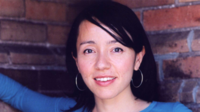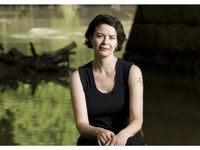Instructors Colin McAdam, Kyo Maclear, & Alissa York on the Unique, Intense, Transformative Humber School for Writers Summer Workshop
The Humber School for Writers is one of the oldest and most prestigious writing programs in the country, and has turned out numerous bestselling authors including the likes of Vincent Lam, Shari LaPena, and Cathy Marie Buchanan. With some of the most acclaimed authors in the country serving as mentors, and two-time Giller nominee David Bezmozgis having recently taken over as Program Director, it's a program packed with incredible resource for emerging writers.
Every summer, HSW offers perhaps their most unique amongst those resources: the Summer Workshop in creative writing - a six day intensive that combines focused editorial feedback on a manuscript with industry-focused sessions to help writers navigate finding an agent, selling a book, contributing as part of a literary community, and promoting their work. It's something of a one-stop shop for writers who are serious about taking their work to the next level both in terms of craft and career.
We got the chance to speak with three of the terrific Summer Workshop instructors - Colin McAdam, Kyo Maclear, and Alissa York - about the value of the program, what they look for in a manuscript, and the advice they offer to writers who are fine-tuning their manuscripts.
The 2018 Summer Workshop runs from July 8 to July 13.
Open Book:
What drew you to wanting to be part of the summer workshop? What is unique about this experience, for both the students and the instructors?
Kyo Maclear:
I love the immersive nature of the workshop. I see it as a creative oasis for writers who are juggling other demands on their time and attention.
Colin McAdam:
Getting paid is always a draw for me, but I’ve enjoyed the workshop in the past – the variety of participants, the collegial atmosphere, the attractiveness of the campus, including its strange, dark history. The classrooms are all very bright and comfortable, and I think the environment is relaxed. The fact that the campus used to be an asylum somehow creates a foundation of stories or puts some ghosts into the walls. And I think participants get a pretty thorough glimpse of the professional side of writing thanks to the guests who speak every day – the agents, publishers, etc. The workshop gives writers a good amount of focused attention on their own work, but the program also gives them a taste of what others are up to and what the industry as a whole is looking like.
Alissa York:
I’ve been hearing rave reviews about Humber and the summer workshop from faculty and former students for over a decade; last year I got to see what all the hype was about. My group brought their best to the workshop every morning – in terms of their own work and their responses to fellow participants’ submissions. The afternoon presentations and panel sessions brought the larger workshop community together for spirited discussions about the process and practice of the writing life – including all manner of practical professional tips. I was amazed by how much ground we covered together in eight days by the lake.
OB:
In your opinion, what are the most important elements of a successful workshop environment?
KM:
An emphasis on process over product, curiosity over mastery, community over competition. The idea of the workshop as a place for super-polished work discourages growth. I want to hold a space for tentativeness and vulnerability, while recognizing that the workshop can, at times, be a charged and un-safe place for some writers.
CM:
Respect for each other and each other’s work is the most important thing. If there is mutual respect, discussions can be honest and productive, and there is less of a will to cause or take offence.
AY:
First and foremost, a great writing workshop runs on respect – for the work at hand, for one another, and for the practice of creative writing (and reading) itself. After that, I encourage active reading and listening toward an exchange of considered, constructive feedback – essentially deep engagement with every work under consideration.
Your CanLit News
Subscribe to Open Book’s newsletter to get local book events, literary content, writing tips, and more in your inbox
OB:
What are you personally looking for in a manuscript right now? What aspects do you find yourself connecting to most in the student work you read?
KM:
I'm drawn to voice and work that hungers after or risks something.
CM:
I don’t look for anything in particular, although I suppose in anything I read I like to be surprised – whether by story or thoughts or language. What appeals to me about these groups is the variety of experience, and the effort to put that across in writing.
AY:
I’m always excited to come across that “something wild” in a writer’s voice – the sense that they’re writing from a place of authenticity. I love those passages that point the way to an individual heart and mind.
OB:
What advice do you find yourself offering most frequently to students?
KM:
I think it helps to find a reader or writing community that can be supportive but also pushy. I encourage students to read widely and to cross-pollinate with other arts. (eg. dance may inspire you to re-inhabit your body differently, music may teach you counterpoint, film can instruct you on editing.)
CM:
I don’t like to be too prescriptive, but I suppose I often tell people to minimize adjectives, to think about how people really speak, and to make an opening as charming or surprising as possible.
AY:
Significant details engage the reader: take the time to make it this particular river, this particular family, this particular love and/or loss.
And no, you can’t write around it (whatever it is).
And yes, it’s worth it.
OB:
What would you say to writers considering enrolling in the workshop?
KM:
Try to be generous - both open-minded and discerning. The workshop is a chance to find new zones of energy and inspiration. Allow yourself to be de-centred in what you know.
CM:
Do it!
AY:
Whether you want to restart, refresh or refine your writing practice, come join us – it’s the most fun you’ll ever have while learning a ton.
__________________________________
Since 1992, the Humber School for Writers (HSW) has offered an immersive, focused workshop to jump start your creative writing. During our Summer Workshop in Creative Writing, mornings are spent in classes with one of Humber’s esteemed writing advisors, and afternoons are devoted to craft and industry talks by Canada’s top authors, poets, publishers, editors and agents.






